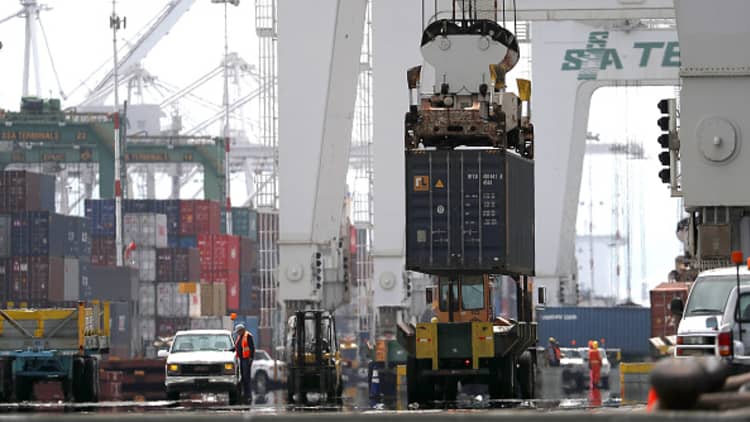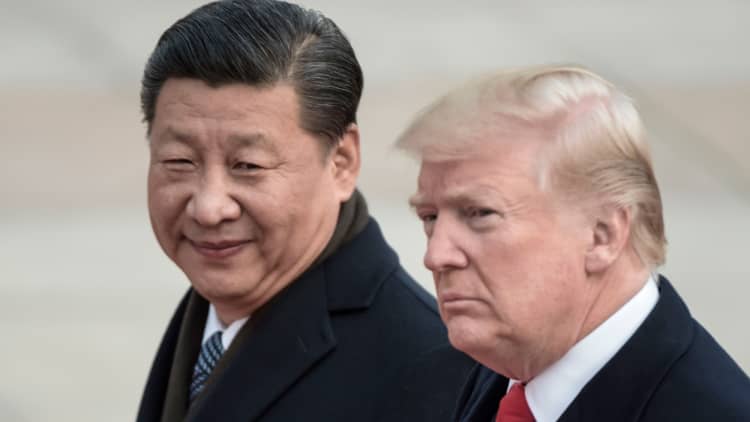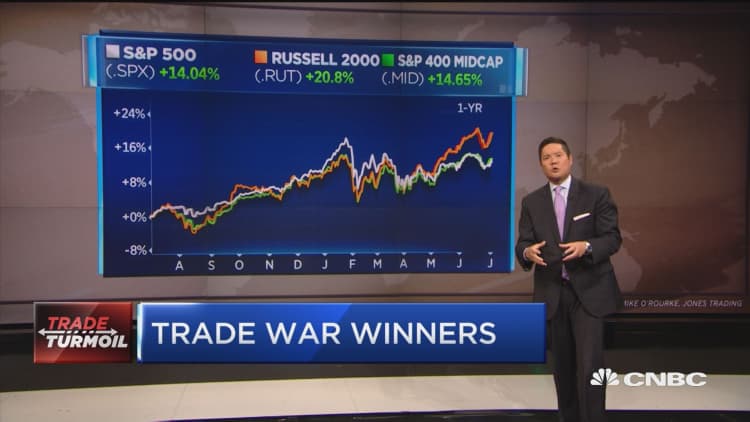
U.S. tariffs on $34 billion worth of Chinese goods kicked in on Friday, escalating a war of words between the world's two largest economies into a full-blown trade conflict.
Washington's 25 percent duties went into effect at midnight EDT and affected products such as water boilers, X-ray machine components, airplane tires and various other industrial parts. China immediately implemented retaliatory tariffs on its $34 billion list of goods issued last month, including soybeans, pork and electric vehicles. Beijing called it the "biggest trade war in economic history."
It's unlikely to stop there. In fact, there will be probably be “escalation upon escalation,” warned Geoff Raby, Australia’s former ambassador to China.
Ahead of the Friday implementation of American and Chinese tariffs, Raby told CNBC that “it looks like the first shots to the trade war are about to be fired.”
China, for its part, was already calling the tariff threats between Beijing and Washington a "trade war" in June.
“I thought that by now a negotiated solution would have been found,” Raby told CNBC’s Martin Soong, adding that it seems the U.S. has “walked away” from any potential deal.
President Donald Trump said Thursday that tariffs on $34 billion worth of Chinese goods will kick in at 12:01 a.m. EDT Friday. Another $16 billion are expected to go into effect in two weeks, he said. He told reporters he would also consider imposing additional tariffs on $500 billion in Chinese goods, should Beijing retaliate against the already-scheduled actions.
China had said it would not "fire the first shot."
Raby, who was also his country’s former ambassador to the World Trade Organization, said Trump seemed to be driven by “very short-term political considerations" ahead of U.S. midterm elections in November.
“He’s escalated the dispute, the midterms are coming up, he’s polling well, and tough rhetoric coming out of the White House seems to be playing well with his base.”
He called it a “big risk” for the world trading system that its key player — the United States — is driven by such considerations.
“We’ll probably see escalation upon escalation. China has made it absolutely clear,” Raby said.
“It cannot show weakness in the face of the United States. ... So I think this comes to some sort of end once there’s been a lot of damage done and people start to come to their senses.”

'The reckoning is in the pipeline'
The direct impact of trade tensions on China’s economic growth in 2018 is expected to be limited at 0.1 to 0.3 percentage points, according to economist estimates.
Liang Hong, chief economist at CICC, told CNBC on Friday that China’s plan to open up its markets “can stay on course,” with its economy growth target of 6.5 percent this year still within reach.
On the other hand, it is the U.S. economy that is expected to take more damage, according to analysts, who warned U.S. levies could affect American firms with investments in China. The world's largest economy would also be hit more considering that it is “pursuing trade wars on multiple fronts,” including its disagreements with Canada and the European Union, DBS said in a note.
“In each skirmish the U.S. targets different economies and consumers, but the retaliation from each counterpart falls on the same group of American consumers and businesses. The reckoning is in the pipeline, in our view," the note said.
Matthew Goodman, an Asian economics specialist at the Center for Strategic and International Studies, said that the White House hasn’t considered the interest of American companies.
“There’s a long track record of U.S. companies and others in the Chinese markets, so that’s a real worry here, ... but in the White House, it seems they either haven’t thought about those ramifications, or they have and they just don’t care because they think they need to turn up the heat,” he told CNBC’s “The Rundown.”
For its part, China claimed Thursday that the United States is attacking the world with its threatened tariffs.
"U.S. measures are essentially attacking global supply and value chains. To put it simply, the U.S. is opening fire on the entire world, including itself," said Chinese Commerce Ministry spokesman Gao Feng.
According to the DBS note, South Korea, Malaysia, Taiwan and Singapore are the economies most at risk in Asia based on trade openness and exposure to supply chains. There is expected to be a drag on growth in 2018, and it could double in 2019.
— The Associated Press, Reuters and CNBC's Chloe Aiello and Marty Steinberg contributed to this report.
WATCH: Trade war stocks that may be winners



